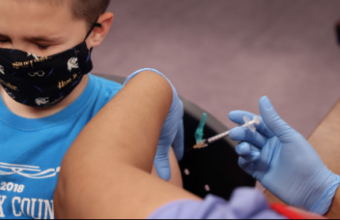COVID-19 News
COVID-19 Update | February 10, 2023
February 10, 2023

COVID-19 Update | February 10, 2023
The California Biotechnology Foundation is committed to keeping you up to date about COVID-19 testing, treatment and prevention advancements. The following resources track what progress has been made as of February 10, 2023. Notable advancements include:
- Pregnant women who receive at least two doses of the mRNA vaccine reduce their infant’s risk of COVID-19-related hospitalization according to a study in the BMJ.
- An experimental COVID-19 antiviral drug is effective at preventing hospitalizations according to a recent study in The New England Journal of Medicine.
- According to experts there are several possibilities why people with symptoms of COVID-19 might test negative, one being COVID-19 often presents like other viral illnesses.
Recent News
- COVID-19 vaccination in pregnancy may benefit both moms and infants
University of Minnesota Center for Infectious Disease Research and Policy – February 9, 2023
Pregnant women can reduce their infant’s risk of COVID-19-related hospitalization by receiving at least two doses of an mRNA vaccine, which are highly effective against maternal Delta variant infection and moderately effective against maternal and infant Omicron infection, suggests a study published yesterday in BMJ. A third (booster) dose offered added protection against Omicron. The University of Toronto–led study used a test-negative design to estimate rates of maternal COVID-19 infection with the Delta or Omicron strains, infant Omicron infection, and infant Delta and Omicron hospitalization among vaccinated and unvaccinated pregnant women tested for infection in Ontario. - An experimental COVID-19 treatment could be a promising alternative, study finds
USA Today – February 9, 2023
An experimental COVID-19 antiviral appears to be effective at preventing hospitalizations without some of the downsides of other treatments. A study appearing in The New England Journal of Medicine found that a dose of interferon lambda prevented 51% of hospitalizations among people who have been vaccinated — an already low-risk group and one that hasn’t been proven to benefit from other treatments. Interferon lambda still has to go through the regulatory approval process, so it’s not available. But the study suggests it could be a viable alternative. - Do you need another COVID-19 booster? We asked California infectious disease experts and the CDC
The Sacramento Bee – February 9, 2023
The end of COVID-19’s spread may be unforeseeable — and questions about vaccines and boosters continue. After publishing a COVID-19 Q&A with Dr. Dean Blumberg, chief of pediatric infectious disease at UC Davis Health, The Bee continued to receive more questions — this time about the bivalent booster. Several readers asked The Bee whether they need to go in for a second round. Currently, there is no guidance recommending people get a second bivalent booster dose. The CDC only recommends one bivalent shot as of now and is encouraging people who haven’t gotten a vaccine before September 2022 to get it soon to prevent severe disease and death — especially if they are older and have underlying conditions. - CDC adds COVID-19 vaccinations to immunization schedules for children, adults
Politico – February 9, 2023
The Centers for Disease Control and Prevention added COVID-19 vaccinations for children, adolescents and adults to its immunization schedule. These updates reflect current agency recommendations. Adding them formalizes that guidance for health care providers and schools. The CDC’s vaccination schedule, released Thursday, does not mandate vaccines. States and localities determine which vaccines schools require for students, and all 50 states have medical exemptions for some vaccines. Some states also have nonmedical vaccination exemptions for religious or philosophical reasons. - What people on Medicare can expect once the COVID-19 public health emergency ends
Stat News – February 9, 2023
People with Medicare will pay more for some COVID-19 tests and treatments after the public health emergency ends, according to the agency that oversees the program. The Biden administration will end the federal COVID-19 public health emergency declaration on May 11, bringing an end to some of the free services that lawmakers had guaranteed patients in various COVID-19 relief laws. Seniors will no longer get free over-the-counter COVID-19 tests, and they will eventually have to pay for COVID-19 treatments like Pfizer’s Paxlovid antiviral. At least at first, however, the antivirals will continue to be free because current doses in circulation were provided by the U.S. government. When the products transition to the commercial market in the summer or early fall, there may be some cost-sharing, the agency said. - Long COVID-19 Symptoms May Be Different Than Symptoms of Common Viral Respiratory Infections
Pharmacy Times – February 9, 2023
Longer lasting symptoms of COVID-19 do not appear to occur more frequently than longer-lasting symptoms of other viral respiratory infections (VRIs), according to a study published in Open Forum Infectious Diseases. What differentiates symptoms of SARS-Cov-2 are the risk of heart palpitations, fatigue, joint pain, developing immune-mediated conditions, and the duration of symptoms post-infection; however, the data remains temporally limited, according to the study. Long lasting COVID-19 symptoms are known to be fatigue, brain fog, and shortness of breath. But there are not many studies examining the other symptoms associated with long COVID-19, which may include persistent respiratory, cardiovascular, neurological, gastrointestinal, musculoskeletal, metabolic, and immune-mediated effects, as well as hair loss, excessive eating, or myocarditis, according to the authors of the current study. - Why the Odds Are Stacked Against a Promising New COVID-19 Drug
The New York Times – February 8, 2023
A new class of variant-proof treatments could help restock the country’s armory. Scientists reported in The New England Journal of Medicine that a single injection of a so-called interferon drug slashed by half a COVID-19 patient’s odds of being hospitalized. For all of its promise, though, the drug — called pegylated interferon lambda — faces an uncertain road to the commercial market. Regulators at the Food and Drug Administration late last year told the drug’s maker, Eiger Biopharmaceuticals, that they were not prepared to authorize it for emergency use. Eiger executives said part of the problem seemed to be that the clinical trial did not include an American site, but rather only sites in Brazil and Canada, and that it was initiated and run by academic researchers, rather than the company itself. - Could you still have COVID-19 if you have symptoms but test negative? A medical analyst weighs in
CNN – February 8, 2023
Although much is now known about COVID-19, many questions remain, especially as the virus continues to evolve and infect people on a large scale. A frequent question from CNN readers and viewers is what it means if someone has COVID-19 symptoms but tests negative for the virus, especially if they have been exposed. Why does that happen? Should they test again and when? Are there other tests they should get, including for other viruses? How can someone find out if they’ve already had COVID-19? Many people believe they have symptoms of COVID-19 but are testing negative. Why does that happen? There are several possibilities. First, COVID-19 often presents like other viral illnesses. Common symptoms include a fever, cough, runny nose, headache or body aches, a sore throat and diarrhea. These are types of symptoms also seen with other viral illnesses, including influenza and adenovirus. It’s possible you may have symptoms you’re identifying as evidence of a COVID-19 infection that are actually due to another virus. - Healthy pre-infection lifestyle linked to lower risk of long COVID-19 in women
University of Minnesota Center for Infectious Disease Research and Policy – February 6, 2023
Women who maintained a healthy weight, didn’t smoke, exercised regularly, got adequate sleep, ate high-quality food, and consumed alcohol in moderate amounts were at roughly half the risk of long COVID-19 as those who followed none of these recommended practices, concludes a prospective study today in JAMA Internal Medicine. At baseline, those with higher healthy lifestyle scores were younger and more likely to be White, with higher socioeconomic status and a lower prevalence of chronic conditions. Of the 1,981 COVID-19-positive women, 44.0% developed long COVID-19, of whom 87.0% reported symptoms lasting at least 2 months, and 56.5% reported at least occasional symptom-related daily life impairment.
Rely on California Biotechnology Foundation to monitor breaking news and provide updates on the latest advancements in COVID-19 diagnostics, vaccines and treatments.
Stay informed on the latest news and trends on the economic and health benefits of this industry by visiting the new CABiotech.org
If you have any questions about informational briefings contact California Biotechnology Foundation Executive Director Patty Cooper at (916)764-2434 or [email protected].


